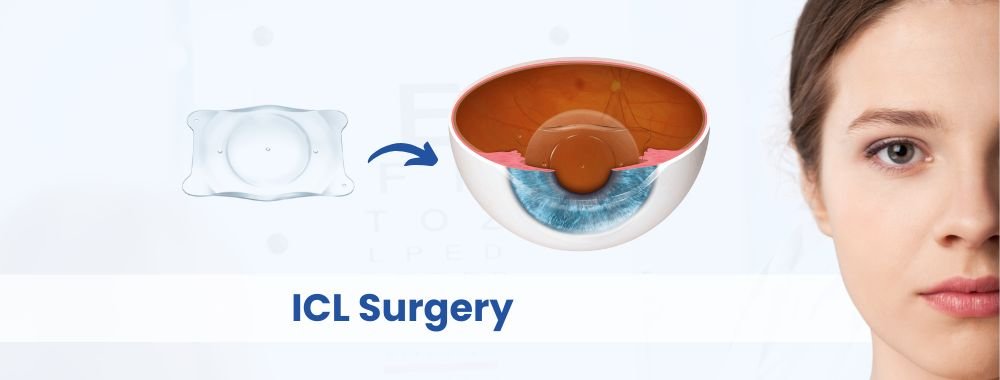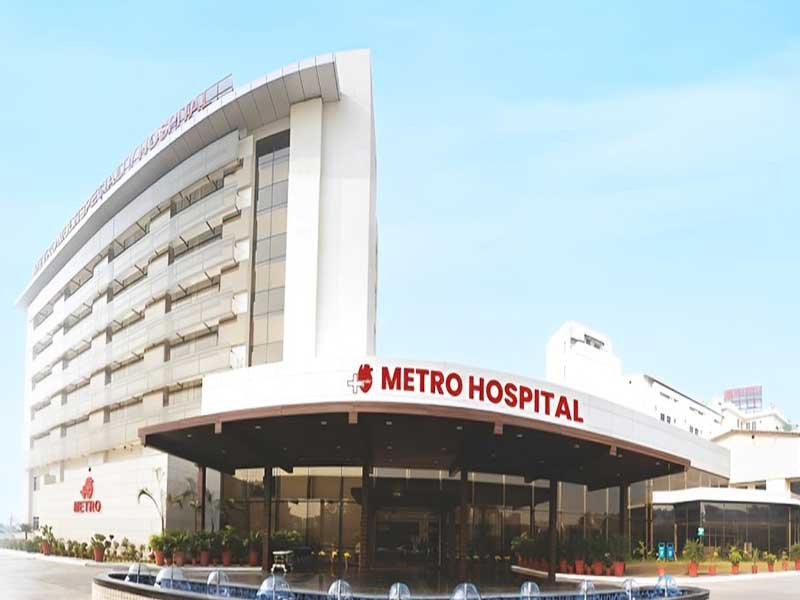Get affordable ICL surgery in India with expert ophthalmologists. Enhance your vision using advanced technology and enjoy world-class treatment at significantly lower costs compared to other Western countries.
Recovery Time
1 Week
Success Rate
99%
Hospital Stay
Day Care
Treatment Type
Surgical
Home Treatments Eye Surgery ICL Surgery
If you wear corrective eyewear like glasses or contact lenses and are you willing to get rid of them? Then, ICL surgery might be an option for you.
It’s an implantable collamer lens, which is a type of artificial lens that is permanently implanted in your eye.
However, finding an affordable solution for it can be tough.
India offers affordable options for your needs with experienced surgeons, internationally accredited clinics and hospitals, advanced technologies, and equipment that make the procedure more effective.

ICL, implantable collamer lens, is a type of artificial lens that is permanently implanted in your eye; however, it is used to treat:
However, implantation requires surgery where a surgeon places the lens between the eye’s natural lens and the colored iris. The lens works like the eye’s existing lens to bend light onto the retina, which produces clearer vision.
Additionally, it is made of plastic and collagen called Collamer, which is a type of phakic intraocular lens that refers to how the lens is placed in the eye without removing the natural lens. Yet, it's not necessary to correct vision problems, but it can reduce the need for glasses or contact lenses.
.jpg)
• Type of ICL Treatment
The severity of your problem can affect the cost of the treatment because ICL treatment is tailored to the patient’s unique requirements, and severe cases require specialized lens design.
• Surgeon's Expertise and Experience
A surgeon’s expertise can also affect the cost of the treatment because India’s top ophthalmologists are highly skilled and internationally trained to treat eye problems and charge higher fees for consultation and surgery.
• Choice of Clinic or Hospital
The choice of hospital can impact the overall cost of the treatment because internationally accredited hospitals and clinics are equipped with advanced technology and facilities, which affect the cost.
• Technology Used
The type of technology and equipment for measurement of the eye and surgery purposes used for ICL surgery offer precise and safer procedures, yet it may affect the cost of the treatment.
• Type of Implantable Collamer Lens Used
There are various implantable collamer lenses available, and each of them features different benefits. Some lenses are designed to provide UV protection, while others are tailored for specific vision correction needs, yet the type of lens used affects the cost of the treatment.
ICL Surgery cost
Treatment Name
Estimated Cost
ICL Surgery 1200 USD
Cost Component | Details | Cost in USD |
Pre-Operative Consultation and Diagnosis | Consultations, tests, etc | 150 USD |
Surgery Costs | Include surgeon charges, type of lens, and hospital stay. | 1200 USD |
Rehabilitation and Follow-Up | Medications, supportive devices, and follow-up visits. | Variable by Procedure |
Fill in your details and we'll get back to you soonGet Free Treatment Quote
Country | Cost Structure |
India | 1200 USD |
United States | 4000-6000 USD |
Germany | 2000-3000 USD |
Turkey | 1500-2500 USD |
◾ Key Takeaways
✅ Affordable Treatment Cost
India offers an affordable treatment option for international patients seeking ICL surgery in India without compromising on quality care.
✅ Advanced Medical Technology
Indian hospitals are equipped with the latest advancements and equipment in implantable collamer lenses (ICL), which offer precise treatment and provide faster recovery times.
The most significant benefit is the cost of ICL surgery in India, which is affordable as compared to other Western countries which making India a preferred destination for the surgery.
India has some highly skilled and experienced ophthalmologists who are dedicated to providing care in ICL surgery with expertise and precision.
India's reputable clinics and hospitals are equipped with the latest technologies and equipment for ICL procedures, which guarantee accurate diagnosis and safe surgery.
Various Indian clinics and hospitals provide a complete package for pre-operative assessment and personalized treatment plans for a better experience.
India has a strong reputation in eye care with various specialized centers known for their expertise and care in vision correction procedures like ICL surgery.
Minimum Cost | Maximum Cost | Hospital Stay | India Stay |
2300 USD | 3500 USD | Day Care | 10 Days |
It involves implanting a corrective lens inside the eye to correct refractive errors like myopia, hyperopia, and astigmatism. However, like traditional contact lenses, ICLs are surgically inserted into the eye’s posterior chamber, which offers permanent vision correction without the need for daily maintenance.
However, it is an ideal treatment option for people with glasses or contact lenses and may be recommended for those ineligible for LASIK or PRK.
ICL surgery is designed to address issues related to the eye, aiming to provide valuable solutions for people experiencing visual impairment. Here are some primary conditions treated with the ICL method:
‣ Complex Myopia
ICL surgery is beneficial in correcting extensive nearsightedness, which is performed when traditional laser eye surgeries like LASIK are less feasible.
‣ Moderate to Severe Hyperopia
Patients with significant farsightedness, who a blurry sight for nearby surroundings, can benefit from this technique.
‣ Astigmatism
It's a condition that is characterized by impaired visual functioning at all distances due to abnormal corneal structure, yet it is also designed to correct an irregular curvature of the cornea or lens.
To be eligible for the surgery, you should be:
ICL is a popular alternative to traditional contact lenses or LASIK surgery for patients who want to correct their vision. However, there are two main types of ICL available, and each type has its unique characteristics and benefits, which include:
This type is designed to correct spherical refractive errors, which include nearsightedness or farsightedness. Additionally, it has a uniform power throughout the lens that allows for clear vision at all distances.
This is specifically designed to correct both spherical refractive errors and astigmatism, which occur when the cornea or lens of the eye is irregularly shaped and causes blurred or distorted vision.
Necessary Diagnostic Tests
Tests | Description |
Eye Power Check-Up | It helps to determine the current state of your eyesight. |
Corneal Topography | It helps to map the surface of the cornea, helps to identify any irregularities, and aids in precise lens selection. |
ACD Measurement or Depth Measurement | It is performed to gauge if there’s any space in the eye to accommodate the new lens. |
Optimal Biometry | It's a non-invasive procedure that helps to measure the eye’s dimensions accurately and helps in selecting the correct power and type of lens. |
Pachymetry (Thickness of the Pupil) | It helps to measure the thickness of your cornea and provides insights that help in planning the surgery. |
White to White Diameter Measurement | It helps to identify the accurate size of the lens, which ensures a perfect fit and optimal |
Retina Check-Up | It helps to detect any existing conditions that might affect the surgery outcome. |
🟢 Do's
🔴 Don’ts
‣ Before the Surgery
‣ During the Surgery
‣ After the Surgery

‣ ICL Soft Lens
It's just the same as its name implies, which is made from a polymeric material that bends easily, and the design is similar to the collagen that is found in your cornea. However, it poses less risk of an adverse reaction.
During the procedure, the surgeon will make a tiny cut in your cornea and place the ICL inside your eye between your iris and lens.
‣ Intraocular Lens
This type of surgery is designed for patients with critical LASIK surgery because of severe nearsightedness, in which a surgeon places the lens between the cornea and the iris so that your eyes can focus better. The surgeon uses small stitches to close the incisions so that the lens can stay in place.
When ICL surgery is not suitable for you, then you’ll be recommended these alternatives:
It's a commonly performed laser refractive surgery that helps to correct vision problems. During this procedure, a special type of laser is used to change the shape of the cornea.
It's a laser surgical procedure that helps to correct your eyesight. Additionally, the laser makes some small changes to the shape of your cornea, which is a clear, protective layer at the front of your eye. However, reshaping your cornea affects how it bends light, which changes how you see.
It's a minimally invasive surgery where a laser creates a lenticule and tiny incisions into your eye to remove your lenticule, which is a disc-shaped piece carved into your cornea by the laser.
It’s a vision correction option for patients with mild to moderate farsightedness. However, it a less invasive than other treatments such as laser eye surgery and it has lower risks.
.jpg)
ICL surgery is generally safe and effective, but potential risks are involved, which include:
It is possible to remove the lenses, which requires another surgery, and if you choose to have lenses removed, then your vision may be worse than before the surgery, because over time, eyesight can need additional correction.
Yes, it is possible to remove the lens if necessary, but the removal process requires another surgery, which results in a worse condition than before the surgery.
After surgery, your surgeon will give you a list of instructions for a smooth recovery and optimal visual outcomes. Here are some dos and don’ts to keep in mind, which include:
🟢 Dos
🔴 Don’ts
After surgery, you no longer need to stay in the hospital because it's a daycare procedure; however, recovery from it takes time, up to 1 week.
The success rate of ICL surgery is 99% in India, and the percentage has increased due to the latest advancements.
Beds: 539
New Delhi
Beds: 230
New Delhi
Beds: 710
New Delhi
Beds: 650
New Delhi
Beds: 191
New Delhi
Beds: 310
New Delhi
Beds: 330
Gurugram
Beds: 380
New Delhi
Beds: 402
New Delhi
Beds: 1300+
Gurugram
Beds: 1000
New Delhi
Beds: 675
New Delhi
Beds: 500
New Delhi
Beds: 400+
Faridabad
Beds: 106
New Delhi

Max Super Speciality Hospital, Saket

Aakash Healthcare Super Speciality Hospital

Indraprastha Apollo Hospital

BLK Max Super Speciality Hospital

Dharamshila Narayana Superspeciality Hospital

Fortis Escorts Heart Institute

Fortis Memorial Research Institute

Manipal Hospital Dwarka

Max Super Speciality Hospital Shalimar Bagh

Medanta - The Medicity Hospital

Moolchand Kharaiti Ram Hospital

Sir Ganga Ram Hospital

Venkateshwar Hospital

Metro Heart Institute with Multispecialty

PSRI Hospital
‣ Team of Top Ophthalmologists
We recommend top doctors with over 20 years of experience in eye treatment, such as cataract surgery, glaucoma, LASIK, retina surgery, ICL Surgery, etc.
‣ JCI/NABH Accredited Hospitals
We have partnered with hospitals that have advanced facilities and the latest technologies, including robotics and machine learning. These hospitals use state-of-the-art diagnostic and treatment equipment to provide you with personalized care.
‣ Other Benefits
We offer quick and clear answers, accurate cost estimates, help with getting medical visas, accommodation in India, and priority scheduling with doctors.
We also help make your arrival in India easy, providing airport pickup, hotel drop-off, hospitalization assistance, and more.
ICL surgery is a procedure that treats poor eyesight from refractive errors by implanting a collamer lens into your eye. However, understanding the ICL cost is important for you if you’re considering this procedure and other factors as well. Consult with a healthcare advisor and make a good decision.
Disclaimer
The information available in this article is only for general information about ICL surgery, and it does not intend to provide accurate cost estimates and other details. So, if you are looking to have a professional opinion on the estimated cost and other details, then contact Mejocare Now.

Medically Reviewed By
QualificationsMBBS, DTMU University, Georgia.Radiation Oncology Resident at Burdwan Medical College and HospitalDr. Aryan Malhotra is a skilled and caring doctor. He is a Radiation Oncology Resident at Burdwan Medical College and Hospital. He treats people with cancer and works closely with patients during their treatment.He completed his MBBS from David Tvildiani Medical University in Georgia. He has passed the USMLE... Read More
Registration Number: 95565
Qualification: MBBS, MD from DTMU University, Georgia, Radiation Oncology Resident at Burdwan Medical College and Hospital
The average cost of ICL Surgery in India is 1200 USD per eye.
The success rate of ICL Surgery in India is around 99%.
You need to stay in the hospital for a few days after getting ICL Surgery.
Visual recovery following ICL surgery is swift. The majority of patients experience 70% to 80% of their vision on the first day after the procedure. Nevertheless, your vision will continue to enhance and become more precise over the next three to four weeks post-surgery. Typically, your eyes will feel at ease within two to three days.
Although ICL has demonstrated its safety and effectiveness, there is a potential for various complications, including:
1. Vision loss due to elevated intraocular pressure.
2. Glaucoma.
3. Blurred vision.
4. Hazy cornea.
5. Retinal detachment.
6. Eye infection.
Yes, it is necessary to have a companion.
At least till after a week of surgery, traveling should be avoided.
Yes, you can do your own research and choose your therapist.
You can use Paracetamol regularly to manage mild to moderate pain. Moderate pain can be managed using non-steroidal anti-inflammatory drugs (NSAIDs) like diclofenac or ibuprofen.
Yes, insurance will cover the cost of ICL Surgery in India.
To discover the top doctors or hospitals in India, you can visit our website, mejocare on the doctors' page, you can filter and find the finest doctors, while on the hospital page, you can identify the best hospitals. Additionally, you can reach out to us, and we will gladly offer you all the necessary suggestions and information you need.
The procedure takes about 20-30 minutes.
No, there is no waiting list for ICL Surgery in India.
This surgical approach requires local anesthesia.
After 2-3 weeks.
After ICL Surgery, you may need to adjust your diet to promote healing and prevent complications. Here are some general guidelines to follow:
Aftercare services provided by the hospital include Monitoring vitals, Wound care, Managing post-operative complications, Rehabilitation Services, and Follow up.
Our care team can help you.
